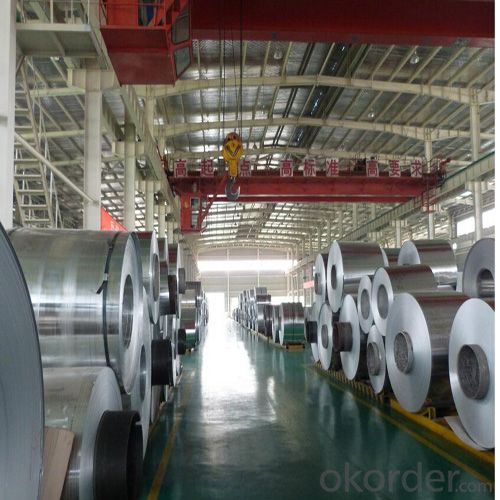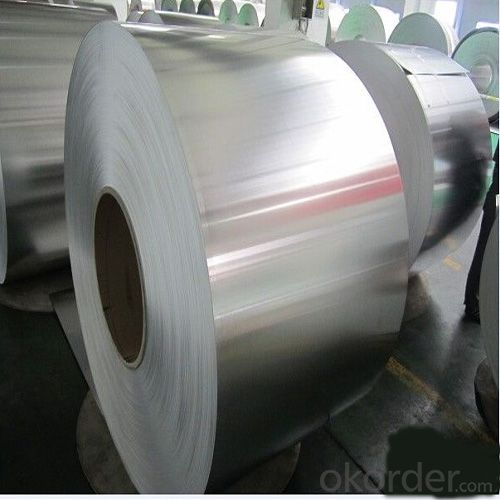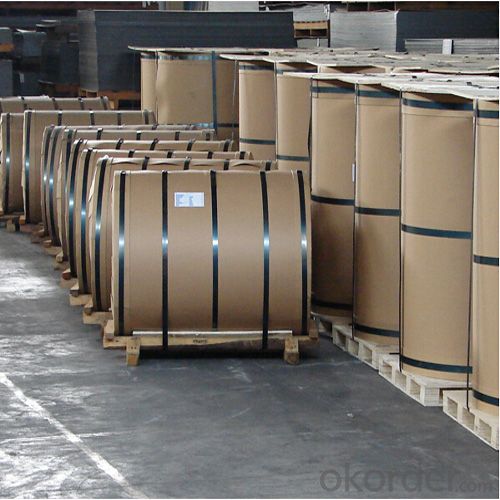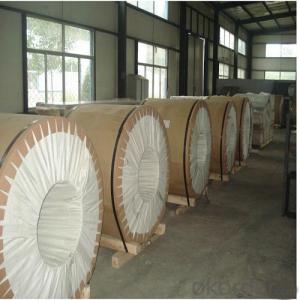Anti-Rust High Strength 5454 Aluminum Coil for Oil Tank
- Loading Port:
- Shanghai
- Payment Terms:
- TT OR LC
- Min Order Qty:
- 5 m.t
- Supply Capability:
- 10000 m.t/month
OKorder Service Pledge
OKorder Financial Service
You Might Also Like
Item specifice
1.Structure of Anti-Rust High Strength 5454 Aluminum Coil Description:
Aluminum 5xxx alloy(5052, 5005, 5182, 5754, 5456 5083), 5xxx alloy has high corrosion resistance, good forming property, good welding performance, commonly used for decoration, automobile, marine service, fuel tank, can cover material, road signs etc.
Aluminum alloy 6061, 6063...6xxx alloy has high strength, good corrosion resistance, weldability, superior for oxidation, commently applied for construction, electron, mould making, extrusions, vehicle etc.Aluminum alloy 7050, 7075, 7xxx alloy is superduralumin, most suitable for aerospace equipment, machine and moulds.If you have requirement feel free to ask for quotation. We have competitive price especially for alloy 5052, 5005, 5182, 5754, 5456 5083 7050, 7075.
2.Main Features of Anti-Rust High Strength 5454 Aluminum Coil:
Good Corrosion Resistance
Good Machinability
High Quality
Competitive Price
3. Anti-Rust High Strength 5454 Aluminum Coil Images:



4. Anti-Rust High Strength 5454 Aluminum Coil Specification:
| Aluminium alloy | Si | Fe | Cu | Mn | Mg | Cr | Zn | Ti | others | Al | |
| per | all | ||||||||||
| 5454 | 0.25 | 0.4 | 0.1 | 0.5-1.0 | 2.4-3.0 | 0.05-0.2 | 0.25 | 0.2 | 0.05 | 0.15 | Remains |
5.FAQ
Q1.How long have you been in this product?
A1:More than 10 years.
Q2. What's the minium quantity(MOQ)?
A2. 5 Metric tons
Q3. How long is shipping time?
A3. 7 (ready-made products)-25 days(OEM)
Q4. How do you guarantee the quality?
A4. 1. Cooperating and Exchaning experience with sevral quoted aluminum companies
2. Japanese and Swiss production line and skilled works (regular training and testing)
3. more than 10 years production experience.
Q5. Do you have after sale service?
A5. Yes. Any quality problem occurs within one year, pls take photoes,we will be responsible.
- Q:Are aluminum coils suitable for air conditioning systems?
- Air conditioning systems can utilize aluminum coils, which are commonly employed due to their numerous advantages. Firstly, aluminum, being a lightweight material, facilitates ease of handling and transportation during installation. Additionally, this lightweight characteristic reduces the unit's overall weight, rendering it more energy-efficient. Moreover, aluminum coils possess exceptional heat transfer properties, thereby enabling efficient air cooling. They exhibit enhanced thermal conductivity, facilitating rapid and effective heat transfer. Consequently, this leads to improved cooling performance and enhanced energy efficiency, resulting in reduced electricity consumption and long-term cost savings. Furthermore, aluminum coils surpass other materials, such as copper, in terms of superior corrosion resistance. Given the exposure of air conditioning systems to moisture and humidity, this resistance is crucial. Aluminum coils can withstand these conditions without corroding or deteriorating, ensuring a longer lifespan and reliable performance. Another advantage of aluminum coils lies in their affordability. Aluminum is a cost-effective material, making it a favored choice among air conditioning manufacturers. This affordability subsequently translates into lower costs for consumers, making air conditioning systems more accessible and economically viable. In conclusion, the suitability of aluminum coils for air conditioning systems is evident due to their lightweight nature, impressive heat transfer properties, corrosion resistance, and affordability. They offer efficient cooling capabilities, durability, and cost-effectiveness, establishing themselves as the preferred choice for air conditioning units.
- Q:Can aluminum coils be used in telecommunications infrastructure?
- Telecommunications infrastructure can employ aluminum coils as they possess several advantages. Firstly, aluminum, being a lightweight and durable material, finds extensive use in various industries, including telecommunications. Its cost-effectiveness, when compared to metals like copper, makes it a preferred choice for many companies in this sector. Moreover, the lighter weight of aluminum coils facilitates easier handling and installation, resulting in reduced labor and transportation costs. Additionally, aluminum's excellent electrical conductivity makes it suitable for transmitting data signals in telecommunications networks. By effectively carrying electrical current, aluminum coils ensure efficient data transmission without compromising quality. Consequently, reliable and high-speed communication over long distances becomes possible. Another advantage of incorporating aluminum coils in telecommunications infrastructure lies in their resistance to corrosion. When exposed to air, aluminum naturally forms a protective oxide layer, preventing rusting and corrosion. This resistance enhances the longevity and durability of the infrastructure, thereby reducing maintenance and replacement expenses over time. Nevertheless, it is crucial to acknowledge that aluminum possesses lower tensile strength than copper. Therefore, the infrastructure's structural integrity must be adequately considered and engineered when employing aluminum coils. Additionally, specific connectors and compatible hardware may be necessary. In conclusion, the use of aluminum coils in telecommunications infrastructure is highly effective due to their cost-effectiveness, lightweight nature, electrical conductivity, and corrosion resistance. Proper planning and design are imperative to ensure the successful implementation of aluminum coils in telecommunications networks.
- Q:What is the typical density of aluminum coils?
- The typical density of aluminum coils is around 2.7 grams per cubic centimeter (g/cm³).
- Q:What are the common surface treatments for aluminum coils in the marine industry?
- Aluminum coils in the marine industry undergo different surface treatments to improve their durability and resistance to corrosion. Anodizing, powder coating, and chemical conversion coatings are some of the most commonly used methods. Anodizing, a popular technique, forms a protective oxide layer on the aluminum surface through electrolysis. This layer not only enhances corrosion resistance but also improves abrasion resistance and appearance. Anodizing allows for customization and aesthetic appeal as it can be done in various colors. Powder coating is another widely employed surface treatment for aluminum coils in the marine industry. It involves applying a dry powder to the aluminum surface, which is then cured under heat to create a durable and protective layer. Powder coating provides excellent resistance to UV rays, chemicals, and abrasion, making it suitable for marine applications in harsh environmental conditions. Chemical conversion coatings are also commonly used on aluminum coils in the marine industry. These coatings are formed through a chemical reaction between the aluminum surface and a solution containing specific chemicals. The resulting coating offers excellent corrosion resistance and acts as a barrier against moisture and other environmental factors. Chemical conversion coatings are often used as a pre-treatment to enhance the protective properties of aluminum coils before applying other coating systems. The choice of surface treatment for aluminum coils in the marine industry depends on factors such as the intended application, environmental conditions, and desired aesthetics. Anodizing, powder coating, and chemical conversion coatings are the most common options, each providing unique benefits to ensure the longevity and performance of aluminum coils in marine environments.
- Q:When you open an aluminum beverage can, do particles of aluminum get into the drink?
- No. Aluminum has metallic bonds, so atoms don't break off that easily.
- Q:Are there any specific guidelines for the installation of aluminum coils?
- Yes, there are specific guidelines for the installation of aluminum coils. When installing aluminum coils, it is important to follow manufacturer's instructions and adhere to industry standards. Some specific guidelines for the installation of aluminum coils include: 1. Proper handling: Aluminum coils should be handled with care to prevent damage. It is recommended to use gloves and avoid dropping or dragging the coils during installation. 2. Compatibility: Ensure that the aluminum coils are compatible with the HVAC system you are installing. Consider factors such as coil size, capacity, and refrigerant type. 3. Coil orientation: Pay attention to the correct orientation of the coil during installation. This includes ensuring that the airflow direction matches the system's requirements. 4. Alignment: Proper alignment of the aluminum coil is crucial for efficient operation. Make sure the coil is level and securely attached to the mounting brackets. 5. Condensate drainage: Ensure that the condensate drain pans and lines are properly installed and functioning. This helps in preventing water leakage and potential damage. 6. Electrical connections: Follow electrical guidelines provided by the manufacturer to ensure proper wiring and connections for the aluminum coil. 7. Insulation: Insulate the refrigerant lines and ductwork as required to prevent condensation and improve energy efficiency. 8. Clearances: Maintain adequate clearances around the aluminum coil for proper airflow and service access. This includes ensuring that there is enough space for cleaning and maintenance. 9. Testing: After installation, perform necessary tests and inspections to ensure the aluminum coil is functioning properly. This may include checking for refrigerant leaks, verifying proper airflow, and testing the system's performance. It is important to consult the manufacturer's installation instructions and any applicable building codes or regulations before installing aluminum coils. Following these specific guidelines will help ensure a successful installation and optimal performance of the aluminum coils.
- Q:What are the potential applications of coil-brushed aluminum coils?
- Coil-brushed aluminum coils have a range of potential applications due to their unique properties. They can be used in interior design, architecture, automotive industry, appliances, electronics, and even in the manufacturing of furniture and decorative items. The brushed texture on the surface of the aluminum adds an aesthetic appeal and can be employed for creating modern, sleek, and sophisticated designs. Additionally, the durability and corrosion resistance of aluminum make it suitable for outdoor applications such as signage and cladding.
- Q:I bought some drain opener as a source of sodium hydroxide and it has little silvery balls in it which I believe are aluminium. How can I separate the two substances with minimal loss of the sodium hydroxide? I don't care about the aluminium.
- Trust me. Its not worth salvaging the hydroxide. Aluminum hydroxide is unbelievably stable and that means you probably won't be able to salvage the hydroxide without doing electrolysis or something difficult like that. That's like trying to obtain hydroxide from methanol CH3OH. Oh yea you can make methanol quite easily from a halomethane by reacting it with a hydroxide of some kind. But you will not be able to remove that hydroxide at all without neutralizing it with an acid. Hydroxides are bloody awful leaving groups. That oxygen is really glued on to that carbon well. You have to really destabilize that methanol to remove that hydroxide. Same with the aluminum hydroxide. Very stable and strong bond.
- Q:Can aluminum coils be used in the production of aircraft fuel tanks?
- Aluminum coils, with their lightweight and durable nature, find application in the creation of aircraft fuel tanks. They are commonly employed in the aerospace industry due to their impressive strength-to-weight ratio. Furthermore, their corrosion-resistant properties make them an ideal choice for fuel tanks, as they can withstand the harsh conditions and chemicals present in aviation fuel. The utilization of aluminum coils enables efficient manufacturing processes, as they can be easily shaped and welded into the desired tank form. Moreover, aluminum possesses excellent thermal conductivity, aiding in the dissipation of heat generated during flight and preventing fuel overheating. In conclusion, aluminum coils are a fitting and extensively utilized material in the production of aircraft fuel tanks.
- Q:What are the different grades of aluminum used in coils?
- Coils utilize various grades of aluminum, each boasting unique properties and applications. Notable grades encompass: 1. The 1000 series, a commercially pure aluminum, excels in fighting corrosion. It finds its niche in chemical processing devices and marine components, where corrosion resistance reigns supreme. 2. The 3000 series alloys shine with moderate strength and impressive formability. Their versatility sees them employed in cooking utensils, heat exchangers, and general sheet metal fabrication. 3. The 5000 series grade impresses with its weldability and corrosion resistance. Marine settings, transportation, and structural components all benefit from its presence. 4. The 6000 series alloys blend strength, formability, and corrosion resistance. As a result, they abound in architectural applications - window frames, doors, and curtain walls. 5. The 7000 series grade touts high strength and toughness. It's a favorite contender within aerospace, sporting goods, and automotive realms, where robustness is paramount. These examples merely scratch the surface of the aluminum grades employed in coils. Selecting the appropriate grade hinges on application-specific criteria like strength, corrosion resistance, formability, and weldability.
1. Manufacturer Overview |
|
|---|---|
| Location | |
| Year Established | |
| Annual Output Value | |
| Main Markets | |
| Company Certifications | |
2. Manufacturer Certificates |
|
|---|---|
| a) Certification Name | |
| Range | |
| Reference | |
| Validity Period | |
3. Manufacturer Capability |
|
|---|---|
| a)Trade Capacity | |
| Nearest Port | |
| Export Percentage | |
| No.of Employees in Trade Department | |
| Language Spoken: | |
| b)Factory Information | |
| Factory Size: | |
| No. of Production Lines | |
| Contract Manufacturing | |
| Product Price Range | |
Send your message to us
Anti-Rust High Strength 5454 Aluminum Coil for Oil Tank
- Loading Port:
- Shanghai
- Payment Terms:
- TT OR LC
- Min Order Qty:
- 5 m.t
- Supply Capability:
- 10000 m.t/month
OKorder Service Pledge
OKorder Financial Service
Similar products
New products
Hot products
Hot Searches
Related keywords





























